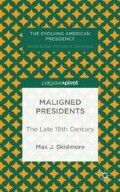Abstract
Cleveland had no military service, and thus broke the pattern of electing Civil War generals. He was a reformer, an advocate of clean government, and was not overly partisan. As the first Democratic president since the war, he favored the South, which contained his party’s base. He maintained Jacksonian small-government attitudes, however unsatisfactory they had become, and believed government assistance to citizens to be improper, even in natural disasters. He was a strong president who succeeded in securing complete repeal of the Tenure of Office Act. Despite his orientation toward business, he was concerned about its power and thus signed the Interstate Commerce Act. His term strengthened both the federal government in general, and the presidency in particular.
Access this chapter
Tax calculation will be finalised at checkout
Purchases are for personal use only
Preview
Unable to display preview. Download preview PDF.
Notes
Henry F. Graff, Grover Cleveland, New York: Times Books, 2002, p. 84.
H. Paul Jeffers, An Honest President: The Life and Presidencies of Grover Cleveland, New York: Perennial/Harper Collins, 2000.
Matthew Algeo, The President is a Sick Man: Wherein the Supposedly Virtuous Grover Cleveland Survives a Secret Surgery at Sea and Vilifies the Courageous Newspaperman who Dared to Expose the Truth, Chicago: Chicago Review Press, 2011, p. 48.
Grover Cleveland, “ Veto Message.” The American Presidency Project, UCSB (February 16, 1887), http://www.presidency.ucsb.edu/ws/index.php?pid=71489; retrieved April 21, 2012; See also Max J. Skidmore, “Anti-Government is not the Solution to the Problem—Anti-Government is the Problem: The Role of Ideology in Presidential Response to Natural Disasters From San Francisco to Katrina,” Risk, Hazards, and Crisis in Public Policy, 3:4 (December 2012).
See Doris Kearns Goodwin, The Bully Pulpit: Theodore Roosevelt, William Howard Taft, and the Golden Age of Journalism, New York: Simon and Schuster, 2013, pp. 584–585.
Eric Arnesen, Encyclopedia of United States Labor and Working Class History, vol. 1, New York: Routledge, 2006, p. 195.
Author information
Authors and Affiliations
Copyright information
© 2014 Max J. Skidmore
About this chapter
Cite this chapter
Skidmore, M.J. (2014). Grover Cleveland, I. In: Maligned Presidents: The Late 19th Century. The Evolving American Presidency. Palgrave Macmillan, New York. https://doi.org/10.1057/9781137438003_5
Download citation
DOI: https://doi.org/10.1057/9781137438003_5
Publisher Name: Palgrave Macmillan, New York
Print ISBN: 978-1-349-49481-1
Online ISBN: 978-1-137-43800-3
eBook Packages: Palgrave Political Science CollectionPolitical Science and International Studies (R0)

